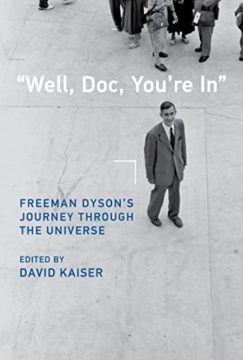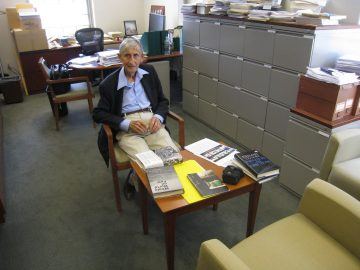by Ashutosh Jogalekar
Freeman Dyson combined a luminous intelligence with a genuine sensitivity toward human problems that was unprecedented among his generation’s scientists. In his contributions to mathematics and theoretical physics he was second to none in the 20th century, but in the range of his thinking and writing he was probably unique. He made seminal contributions to science, advised the U.S government on critical national security issues and won almost every award for his contributions that a scientist could. His understanding of human problems found expression in elegant prose dispersed in an autobiography and in essays and book reviews in the New Yorker and other sources. Along with being a great scientist he was also a cherished friend and family man who raised six children. He was one of a kind. Those of us who could call him a friend, colleague or mentor were blessed.
 Now there is a volume commemorating his remarkable mind from MIT Press that is a must-read for anyone who wants to appreciate the sheer diversity of ideas he generated and lives he touched. From spaceships powered by exploding nuclear bombs to the eponymous “Dyson spheres” that could be used by advanced alien civilizations to capture energy from their suns, from his seminal work in quantum electrodynamics to his unique theories for the origins of life, from advising the United States government to writing far-ranging books for the public that were in equal parts science and poetry, Dyson’s roving mind roamed across the physical and human universe. All these aspects of his life and career are described by a group of well-known scientists and science writers, including his son, George and daughter, Esther. Edited by the eminent physicist and historian of science David Kaiser, the volume brings it all together. I myself was privileged to write a chapter about Dyson’s little-known but fascinating foray into the origins of life. Read more »
Now there is a volume commemorating his remarkable mind from MIT Press that is a must-read for anyone who wants to appreciate the sheer diversity of ideas he generated and lives he touched. From spaceships powered by exploding nuclear bombs to the eponymous “Dyson spheres” that could be used by advanced alien civilizations to capture energy from their suns, from his seminal work in quantum electrodynamics to his unique theories for the origins of life, from advising the United States government to writing far-ranging books for the public that were in equal parts science and poetry, Dyson’s roving mind roamed across the physical and human universe. All these aspects of his life and career are described by a group of well-known scientists and science writers, including his son, George and daughter, Esther. Edited by the eminent physicist and historian of science David Kaiser, the volume brings it all together. I myself was privileged to write a chapter about Dyson’s little-known but fascinating foray into the origins of life. Read more »

